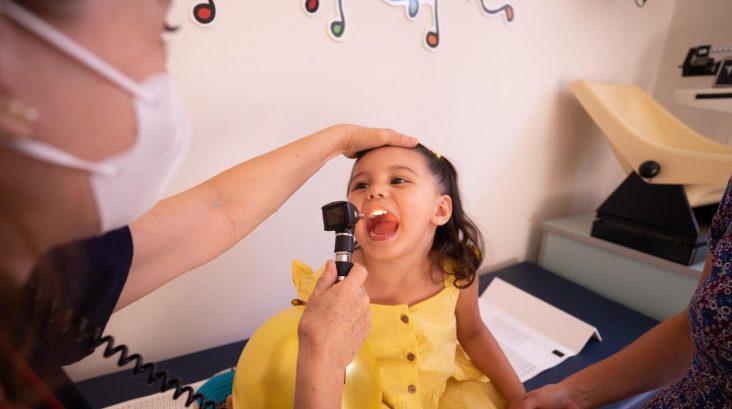Report: 26% surge in Arkansas children without health insurance (UPDATED)
by June 24, 2021 10:19 am 1,165 views

Editor’s note: This story has been updated to include comments from Gov. Asa Hutchinson.
Despite decades of effort and an expansion of Medicaid, Arkansas saw a dramatic surge in the number of children going without health insurance between 2018 and 2019, according to a new report released this week.
According to the KIDS COUNT Data Book produced by the Annie E. Casey Foundation, Arkansas reported that 43,000 children were without health insurance in 2019 compared to 34,000 in 2018. That equates to a 26% increase in uninsured children, although overall only 6% of Arkansas children are without health insurance.
Some potential reasons for the dramatic spike in the uninsured include complications surrounding Arkansas’ work requirement to receive Medicaid expansion insurance and hesitancy among immigrant families to sign up for publicly-assisted health insurance due to the Trump administration’s efforts to alter immigration policy.
Gov. Asa Hutchinson disputed those possibilities and said the state is heading in a better direction on children’s health when looking at more recent data. He agreed that some minority communities have seen decreases in coverage.
“There is no data to tie children insurance rates to the work requirement. National studies point to the biggest drops in coverage for children are among Hispanic and undocumented populations and are a result of a cut back in outreach efforts,” he said.
“Arkansas didn’t see a significant drop in enrollment during 2019. As of 1/1/19 we had 404,733 children enrolled in Medicaid and CHIP. As of 1/1/20 we had 412,757 children enrolled,” Hutchinson said. “The percentage of children with Medicaid or CHIP actually decreased in states with Medicaid expansion. We presume this is because their parents moved up the economic ladder and received insurance coverage from other sources other than Medicaid, while there was no change in non-expansion states.”
The annual report covers statistics in 50 states using household data. It noted that many states in the South and West rank toward the bottom in the Data Book and warned that when additional data from the pandemic is analyzed, conditions could become more dire.
“The annual KIDS COUNT data and rankings represent the most recent information available but do not capture the impact of the past year [2020],” the report states in an executive summary.
The report noted that nationally in 2020, according to preliminary data, more than one in eight adults with children in the household (13%) lacked health insurance. This figure was 23% for Latinos, 18% for those of two or more races or another race and 15% for Black households.
In 2019, Arkansas had bottom 10 rankings in six of the 16 well-being indicators, which cover the areas of economic well-being, education, health, and family and community. Still, Arkansas’ overall ranking in 2019 improved to No. 39 compared to last year’s ranking of No. 40 overall.
In addition to the declining health insurance rate among children according to the KIDS COUNT report, Arkansas has seen an increase in the percentage of low-birthweight babies and in the child and teen death rate over the past decade.
“The COVID-19 pandemic is the most extraordinary crisis to hit families in decades,” said Lisa Hamilton, president and CEO of the Annie E. Casey Foundation. “Deliberate policy decisions can help them recover, and we’re already seeing the beginnings of that. Policymakers should use this moment to repair the damage the pandemic has caused — and to address long-standing inequities it has exacerbated.”
“The data paint a precarious picture for Arkansas’ children, even before the pandemic,” said Rich Huddleston, executive director of Arkansas Advocates for Children and Families, Arkansas’ member of the KIDS COUNT network. “It is critical we make bold policy changes to improve outcomes for kids as we come out of the current crisis.”
For the better part of the last decade, Medicaid expansion – the private option and Arkansas Works – have helped reduce the number of uninsured children and adults in Arkansas, but problems remain. A new version of Medicaid expansion, ARHOME, is being submitted for consideration by federal health officials. In lieu of the KIDS COUNT report, AACF has recommended a number of policy changes to address health care coverage for children:
- Adopt continuous eligibility for ARKids A. One-year continuous eligibility would ensure that a child’s coverage is not terminated within a single year because of fluctuations in family income that are common for low-income families. Arkansas already has this policy in place for children with slightly higher family incomes enrolled in Arkansas Medicaid ARKids-B.
- Adopt presumptive eligibility for Medicaid for children and pregnant women. Presumptive eligibility would allow Arkansas to temporarily enroll persons in Medicaid while waiting for their full applications to be processed. Presumptive eligibility on a provisional application allows the children and pregnant women to begin receiving services immediately without having to wait for the full Medicaid application to be processed.
- Conduct ARKids First outreach and enrollment, especially targeting immigrant families.
- Provide one-year postpartum Medicaid coverage for mothers instead of the current 60 days.
- In the proposed ARHOME waiver the state will soon submit to the federal government, do not impose any requirements that would make it more burdensome for families to maintain health care coverage under Arkansas’ Medicaid expansion.
Talk Business & Politics asked the seven candidates for Arkansas governor in 2022 to comment on this report and outline what they plan to do to address children’s health, if elected. That story will post later today.
